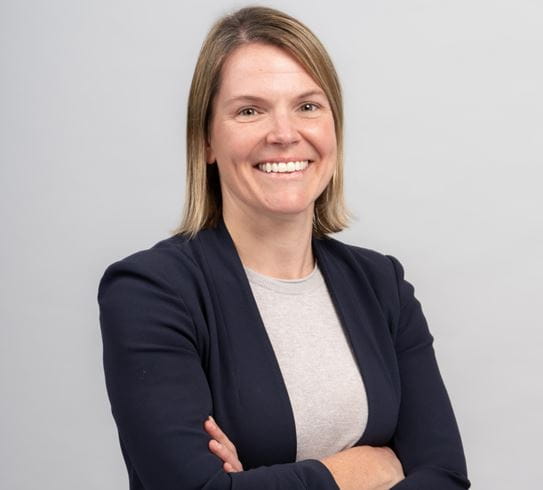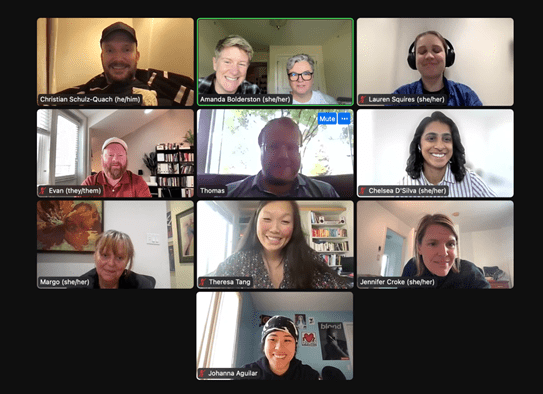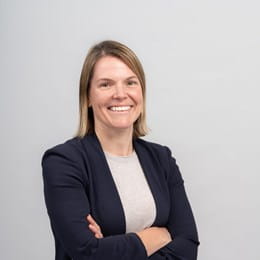Understanding the care gap

While working in the gynecology clinic at the Princess Margaret Cancer Centre in Toronto, Dr Croke noticed a care gap among transgender and gender diverse patients.
“I treat breast cancers and gynecological cancers, which are typically considered gendered cancers. When we think breast cancer or gynecological cancers, we think of women or those born as women. But male breast cancer does happen in about 1% of men, and gynecological cancers can affect those born as female, but not necessarily those who identify as female,” Dr Croke says.
When Dr Croke began treating a trans male patient at the gynecology clinic, many of her colleagues acknowledged a lack of confidence in meeting the needs of this patient population.
“It really highlighted that this is a big gap we have right now. It’s our job as healthcare providers to provide high-quality, patient-centered inclusive care. If we don't address it now, it's only going to increase and continue to create negative experiences for trans and gender diverse patients,” Dr Croke says.
Working at Princess Margaret, a big academic cancer centre that leads innovative research, and then seeing such a big gap… if it's in our clinic, it would be in other clinics.
Barriers in cancer care for trans and gender diverse patients
When it comes to healthcare, some barriers trans and gender diverse people face is the fear of discrimination, feeling unsafe, concerns about needing to come out, and concerns about working with healthcare providers or systems that may not understand their lived experience or background. This can lead to avoidance of healthcare and less satisfaction with care.
Most educational resources and support are also made for cisgender and heterosexual people. For people outside of these demographics, questions about their needs can often go unanswered.
If someone walks into a cancer centre and potentially doesn’t feel safe or supported, or they don't feel like any of the information being told to them is relevant or appropriate, they start off right away without forming a therapeutic relationship [with their healthcare provider].
Dr Croke explains that because of these care gaps, trans people often avoid seeing a doctor. As a result, trans people have lower rates of preventative cancer screening and end up with more advanced cancer diagnoses, poor prognoses and worse cancer outcomes.
Trans patients also have higher rates of anxiety, higher psychosocial distress and depression. They're at risk of certain cancers, such as prostate cancer and HPV-associated cancers.
“Noticing these gaps in our clinic was what led me to wanting to do something about it,” Dr Croke says.
We have a responsibility to take action and lead changes to create safer, more equitable and inclusive access to health care.
A project to improve equitable and inclusive care
Funded by the Canadian Cancer Society, Dr Croke is leading a project to address the knowledge gap in cancer care that affects trans and gender diverse patients.
Dr Croke and her team plan to use their findings to create inclusive care guidelines for trans and gender diverse individuals. The team will create educational materials to help healthcare professionals better understand this patient population, train and build confidence in using inclusive language, and help healthcare workers better understand some of the backgrounds, experiences and data.
The ultimate goal will be to improve and advance equitable care, accessible care and inclusive care for all patients that come into any cancer centre across the country. Trans and gender diverse patients are one example of us trying to improve equity, diversity, inclusion and accessibility, and address this gap that exists in multiple areas within healthcare and within oncology.
The first part of the team’s research is to better understand the experiences and perspectives of trans and gender diverse patients with gynecological cancers. Dr Croke and her nationwide team will work with trans and gender diverse patient partners, healthcare providers, and community organizations such as Praxis House, Queering Cancer, and the Sexual and Gender Diversity Program at Princess Margaret.
“This kind of research is very important in 2025 because of the current political climate and environment we are living in,” Dr Croke says. “There have been a lot of anti-trans laws and policies leading to increased marginalization and discrimination towards this group. From an academic or research point of view, there's a lot of defunding of some of these initiatives that have had their objectives set in advancing equity, diversity, inclusion, anti-racism and accessibility.”
By aiming to foster more inclusive hospitals and institutions, and educating more healthcare providers with this project, Dr Croke and her team hope to open up more opportunities for similar inclusive research in other areas.

As healthcare providers, it is our responsibility to ensure that all patients feel that they are receiving the best care. In order to receive the best care, patients need to feel safe, to feel that they can trust their provider and trust the system, to feel that they're getting equitable access to resources, equitable access to treatment, and that they feel that they are valued as patients and as people.

Help us fund the work of researchers like Dr Croke.
Help create a future without cancer
With support from readers like you, we can continue to make a meaningful impact for people affected by cancer.
We are determined to increase survival, stop cancer before it starts, and improve lives. But we can’t do it without you.
If everyone reading this gave just $5, we could achieve our goal this month to fund the most promising research, compassionate support and transformative advocacy. Please give today because every contribution counts. Thank you.
